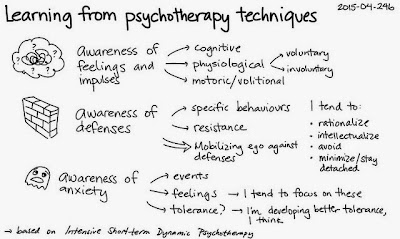 |
| Not my notes, but a pretty cool idea. Photo by Sacha Chua |
I first sought help for my brain because my body was killing me.
I had been experiencing severe pain and discomfort that seemed to have no tangible physical explanation. A few WebMD searches later, and I was either headed to an early grave or doomed to spend the rest of my life with a debilitating, painful disease.
The fear was overwhelming.
I signed up for therapy, online (Thank you, technology).
I had been thinking about going for years, but it was pain and fear that pushed me over the edge.
Going to therapy changed my life, and all I could think was, "Why didn't I do this sooner?"
Therapy is not a panacea: a cure for every kind of physical, emotional, spiritual or mental pain. But it has been a powerful, healing force.
So in case you've been thinking about going, or you went once and never went back, or you used to go, but stopped--
My intent is to address some of the barriers that kept me from taking the first step. Maybe you can relate.
I didn't go to therapy because...
1. No one in my family ever went to therapy, talked about going, or mentioned it as an option.
There are certain kinds of pain that are not okay to talk about. It could be physical pain--to be transparent, part of what propelled me into therapy was the way in which my family both did and did not respond to my physical (and by extension, emotional) pain.
It might be helpful to ask:
What kinds of pain are okay? Not okay?
How am I allowed to talk about pain?
What does empathy look like in my family?
Is there a distrust around being vulnerable? Is there an escape from it, such as humor, sarcasm, distraction, ridicule, ignoring, anger, silence?
How does my family treat vulnerability in general?
2. I had never experienced a major, identifiable trauma that would justify going.
There's a social stigma to seeking therapy: that something deep and terrible must be wrong with you. Well, I definitely felt like there was something wrong with me, but I had nothing to point to, to say, "This! This is why I feel broken."
There's a false sense of shame that tends to go with trauma, even vague, unidentifiable trauma. There's a false sense of shame around needing help. But shame doesn't mean there is something wrong with you--and neither does going to therapy.
If your buddy sprained his ankle, would you ridicule him for going to the doctor instead of playing full court basketball?
"C'mon! What's wrong with you! Why can't you keep up?"
Just like you wouldn't feel shame over going to the hospital for an infected wound or broken bone, seeking therapy merely means that you are human, and that it's possible that things could get better, could be better.
3. I had a traumatic experience with pastoral counseling.
Just as there is a social stigma to therapy, there can also be a spiritual stigma--the belief that God, the church, your pastor, small group, the Bible, and ten hours of prayer per day should be able to cure all that ails you emotionally and psychologically.
There's the belief that simply grasping the truth of "God loves you" and maybe a few cathartic crying sessions at the altar will bring healing to even the deepest, most ingrained sense of shame.
I really wish that were true.
I'm not completely discounting pastoral counseling or any of the spiritual practices listed above. But I have also experienced firsthand how damaging it can be to receive non-professional counseling that both goes too far and doesn't go far enough.
I believe the intent of my pastor was not to harm me, but to help me. However, emotionally it was akin to performing surgery without proper training, exposing a deep wound to the air and the elements, and then expecting my heart to heal itself.
It didn't.
There is absolutely nothing wrong with seeking professional help outside of the church. There is nothing wrong with going to a non-Christian therapist, even if you are a Christian.
There is nothing wrong with being hurt because someone dug around in your emotional guts with a penknife and had absolutely no clue what they were doing.
I wish at the time that instead of shutting down because I was "broken" (and if not even God or my pastor or my spiritual community could help me, who could?), that I had sought out a professional therapist.
4. I thought I couldn't afford to pay for therapy.
This was a huge barrier for me.
Therapy is expensive. I had no health insurance. However, I was also unaware that there are many low-cost and affordable options for seeing a therapist.
I eventually found a non-profit organization in Los Angeles that provides sliding scale membership and counseling services. If it weren't for the availability of low-cost counseling, I don't think I would have ever gone.
Again, therapy is not a panacea. Not all therapists are created equal. It really helps to find the right fit.
If you are thinking about going to therapy, I hope that you take the leap. The barriers are real, but you are definitely, definitely worth it.
[If you would like information on low cost therapy options in the Los Angeles area, please contact me.]
